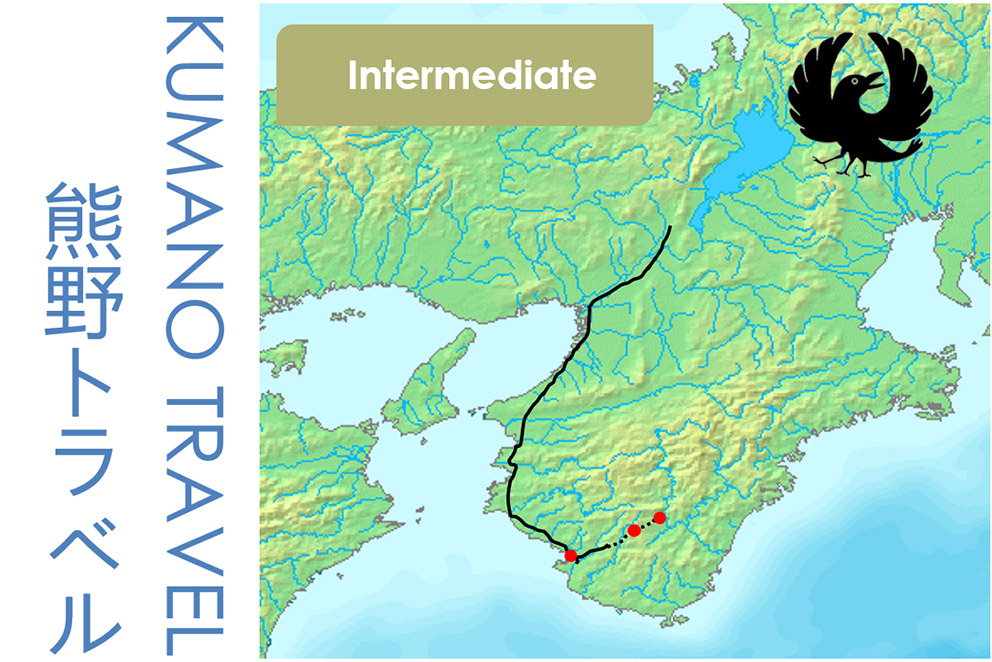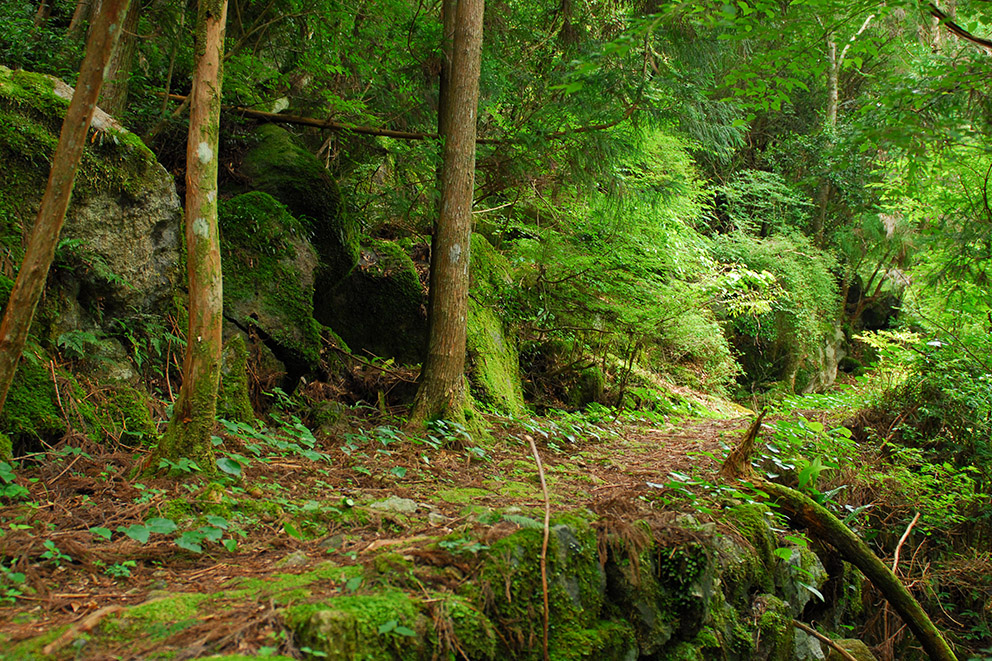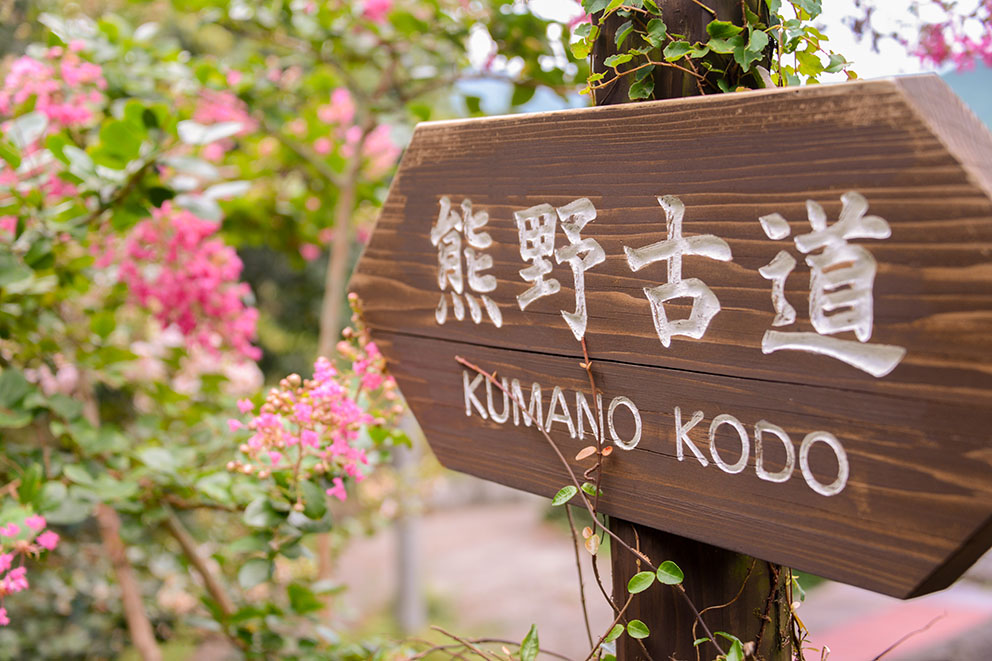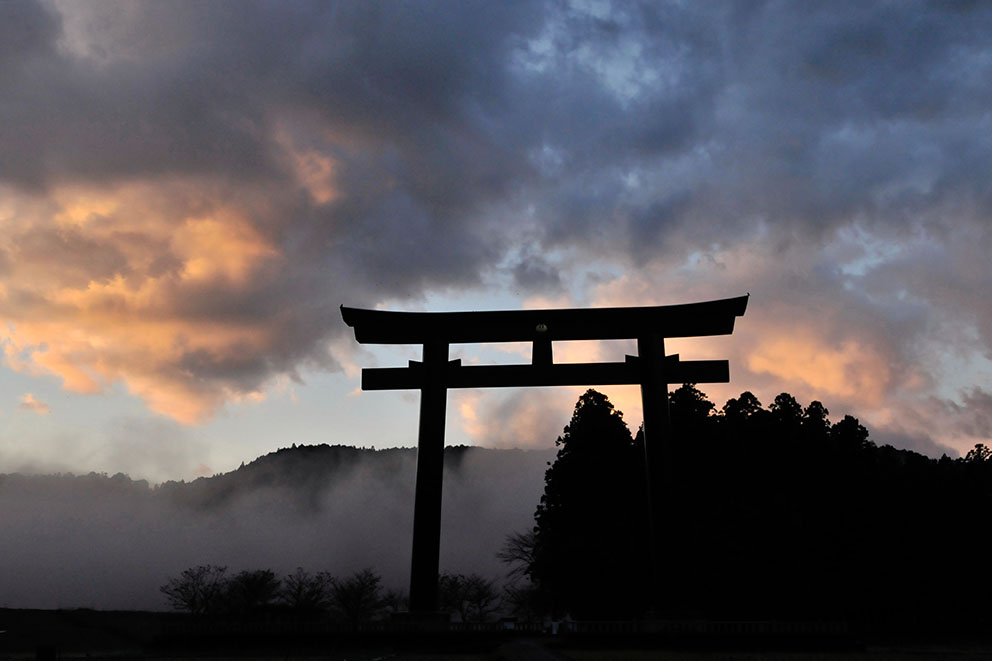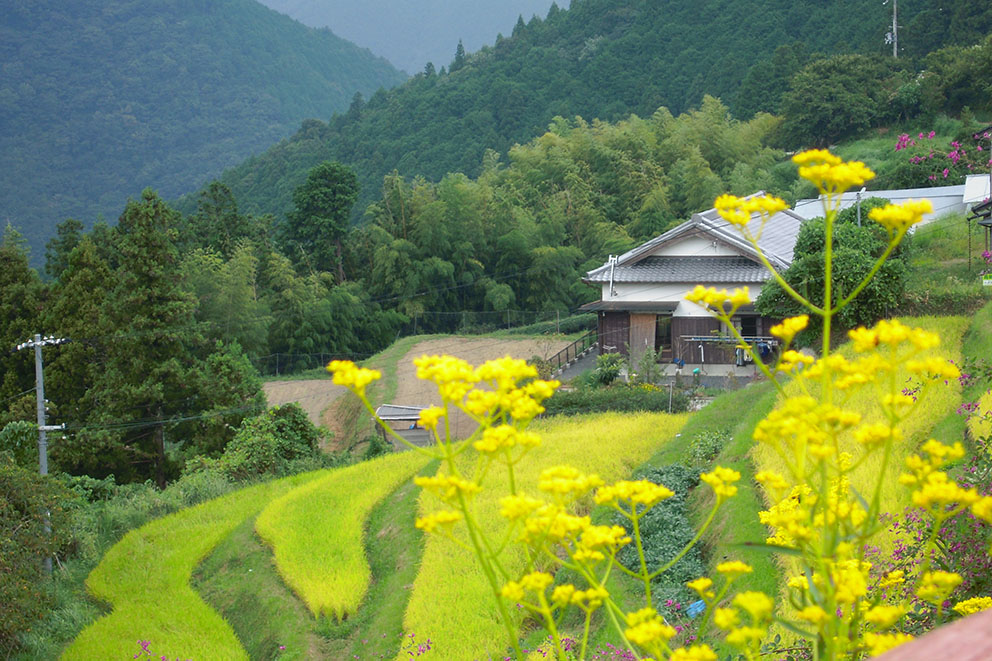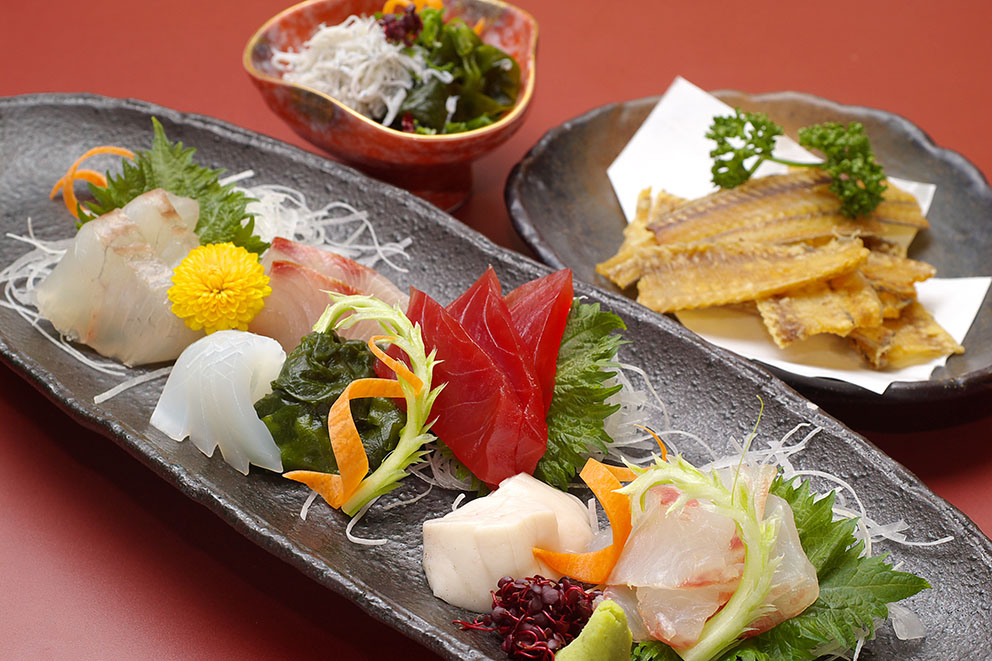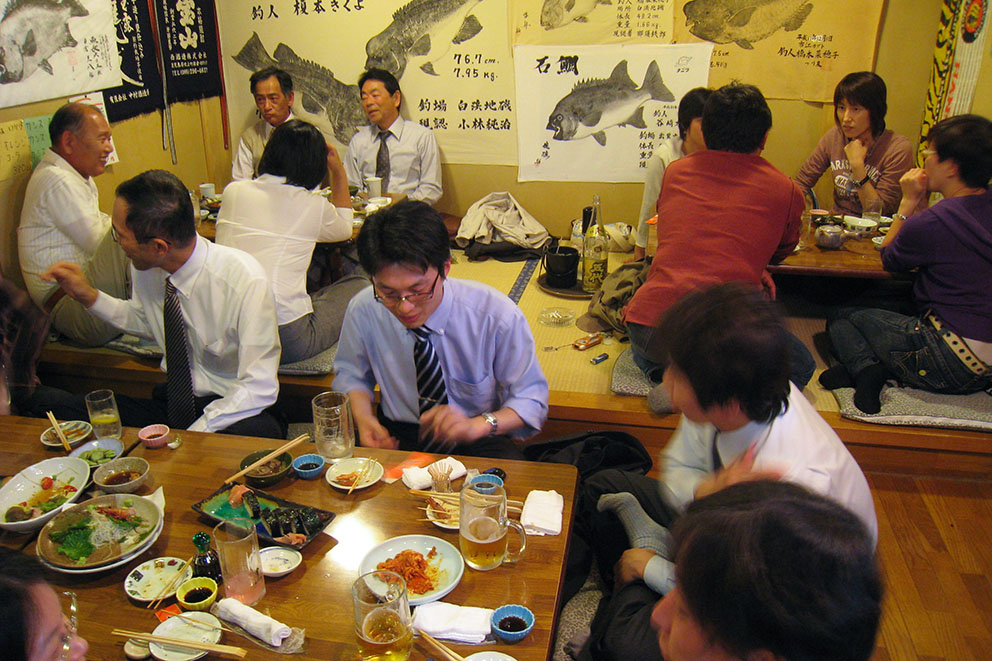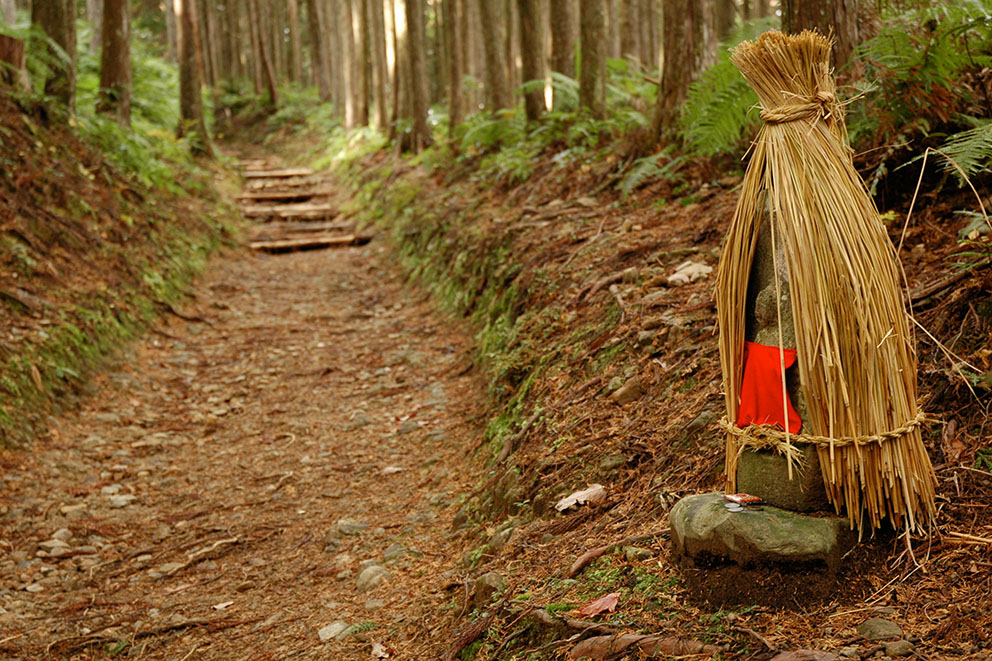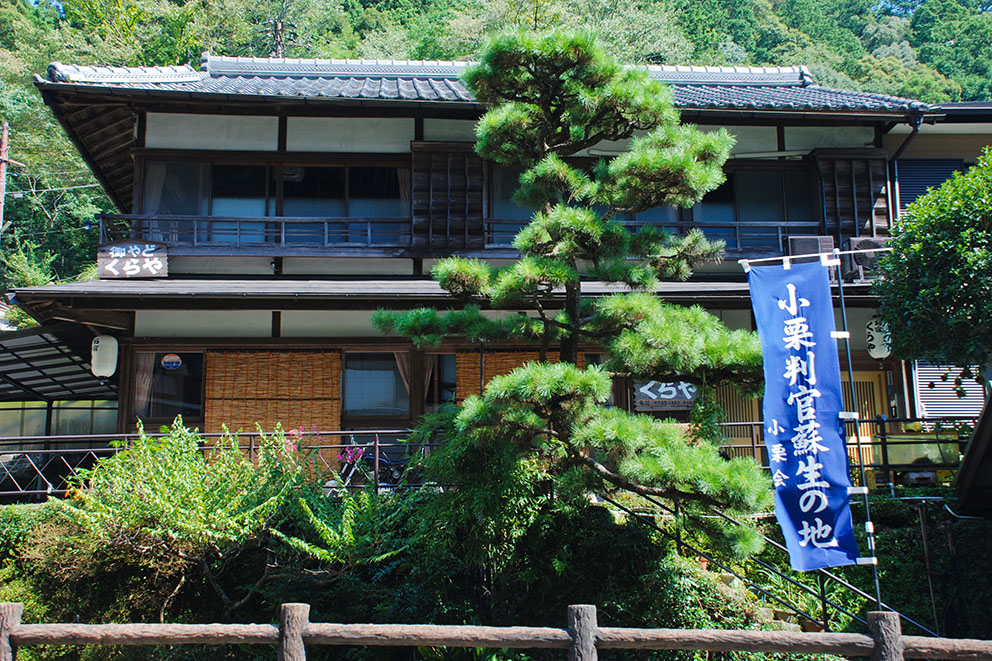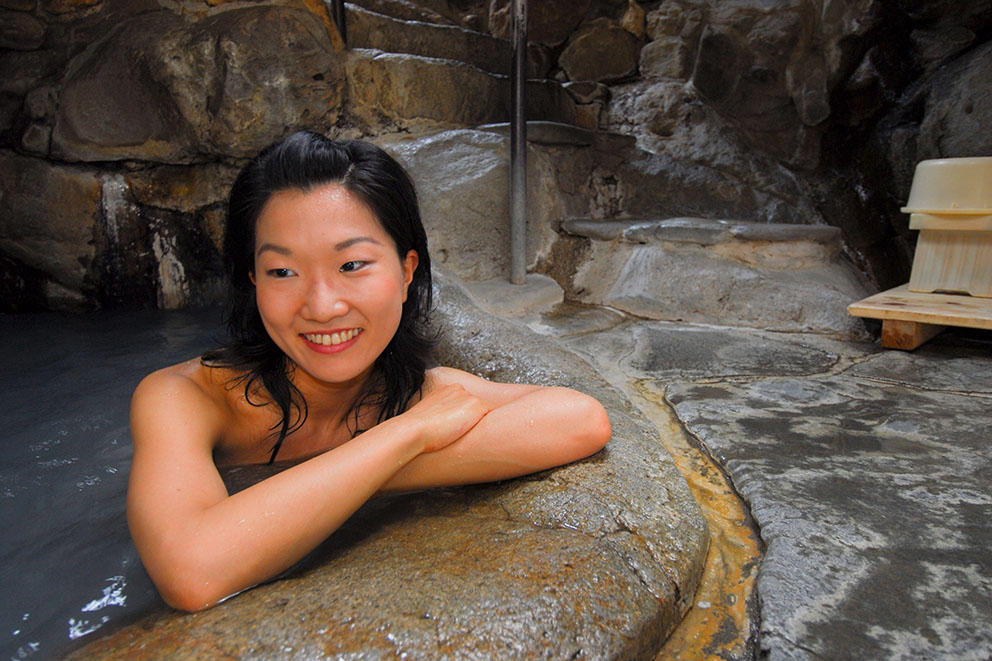KUMANO KODO Trek - 4 days | Nakahechi, Takijiri to Hongu | 2
Rating & Reviews
4.7
Description
Route: Kyoto/Osaka | Tanabe | Takahara | Nonaka | Hongu | Yunomine Onsen | Osaka/Kyoto
Duration: 4 days & 3 nights (2 days walking)
Overnight: Tanabe, Chikatsuyu, Yunomine Onsen
Overall Level: Intermediate/Advanced (Advanced if walk the full day on Day 2. Shorterning Day 2 makes for more of an intermediate walk)
Type: Self-guided or guided
Transportation: Train, Bus, Walk
Daily Luggage Shuttle: Available for all days
Walking Difficult: Day 2=3, Day 3=4.5
What is walking difficulty?
Recommended For: Active Walkers
| WHAT IS A MODEL ITINERARY? Model Itineraries are sample travel plans to help you organize your trip, an easy way to add contents to your cart that match your itinerary. These are not package tours. You can use them as they are, adjust them to your needs, or contact us for more ideas. |
|---|
| PRICE Price depends on which accommodations and services you book. All prices are online for your reference. |
|---|
- DAY 1
-
Train from Osaka/Kyoto to Kii-Tanabe (3 hrs)
Stay in Tanabe
- DAY 2
-
Bus from Kii-Tanabe to Takijiri (~40 min)
Walk Takijiri-oji to Chikatsuyu-oji (~13 km, 6~7 hrs)
Stay in Chikatsuyu
- DAY 3
-
Walk Chikatsuyu-oji to Kumano Hongu Taisha (~25 km, 9~12 hrs) [Shorter walking options available]
Bus from Hongu to Yunomine Onsen (~10 min)
Stay in Yunomine Onsen
- DAY 4
-
Bus from Yunomine Onsen to Tanabe (~1 hr 45 min)
Or other options.
Itinerary Map
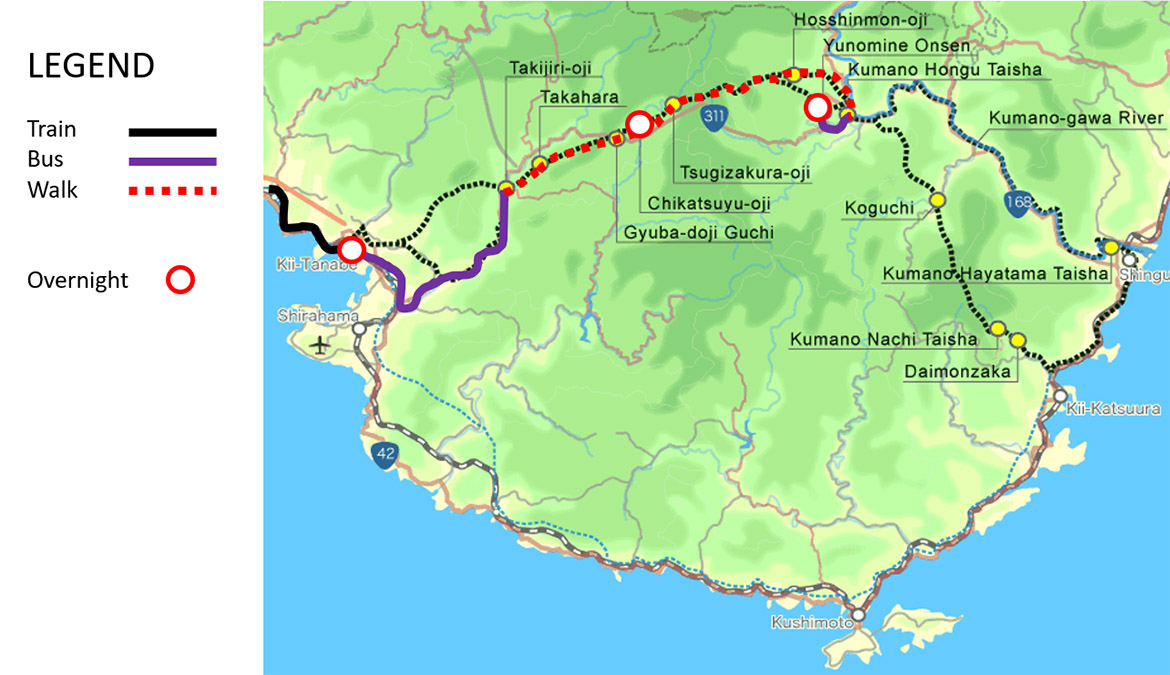
Detailed Itinerary
BEFORE YOUR VISIT
-
PREPARATION
Preparation and planning is the key to a safe trek in the sacred Kumano mountains.
Choose a route that you have adequate experience and physical strength to safely complete.
Wear appropriate clothing and footwear, and carry necessary gear.
NOTE: Details sometimes change, especially bus schedules, so please double-check times before your trip. If you notice something incorrect, please let us know. Thank you! -
WHEN TO VISIT
The Nakahechi route is open year round.
Summer can be hot and humid, and winter has a slight possibility of snow at higher elevations (from end of December to end of February) although it usually melts shortly it falls. The winter months have shorter daylight hours.
Japanese national holidays and long-weekends can be busy so best to avoid (especially golden week in the beginning of May and Obon mid-August).
NOTE: It is often best to come mid-week as capacity is limited in smaller villages along the trail.
-
RESOURCES
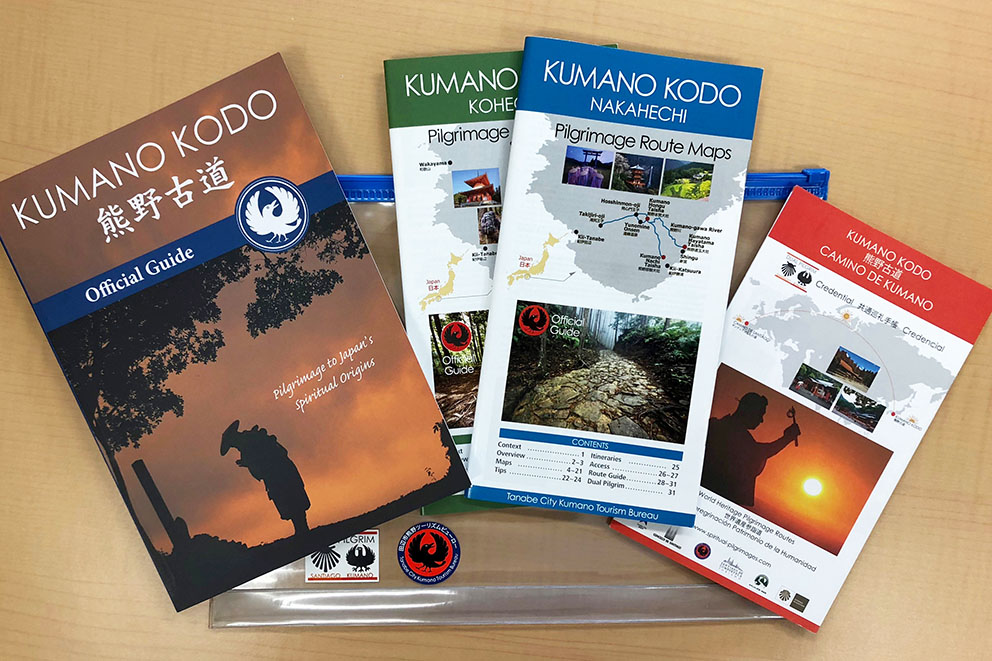 There are many useful resources related to the Kumano Kodo pilgrimage routes. Please use these to make the most of your trip.
There are many useful resources related to the Kumano Kodo pilgrimage routes. Please use these to make the most of your trip.
Maps and Official Guide Book, are available onsite in Tanabe. Online “Pilgrim Packs” including these materials can be mailed in advance. -
INCLUSIONS
The itinerary below is a sample.
Only the products and services that you book are included. For example if you would like lunch boxes or daily luggage shuttle, these must be reserved in advance. They are not included unless you book them.
Transportation fees are not included. It is easy to pay transport costs as you go. -
GUIDED or SELF-GUIDED
This model itinerary can be done guided or self-guided.
1. Self-guided. Use the detailed information online and onsite to complete your walk independently.
2. Guided. Hire a local guide to have some comradery on the trail while experiencing the region’s rich culture.
3. Partly-guided. Or have the best of both! Hire a guide for the first day to get you going and then complete the itinerary on your own.
NOTE: The itinerary below is based on option 1. Self-guided -
LUGGAGE OPTIONS
There are a few options for your luggage.
1. Daily Luggage Shuttle. Luggage is transferred to your accommodation everyday (This is often the most popular option. If required, please book when making your accommodation reservations).
2. Next-day or Later Luggage Shuttle can be arranged onsite without reservations at local convenience stores.
NOTE: The itinerary below is based on option 1. Daily Luggage Shuttle -
MEALS
Immersing oneself in local cuisine is part of the Kumano experience.
1. At Accommodations. Meals are most often served in accommodations in rural areas, as options for eating outside are limited to non-existent. (Eating the set meals at accommodations is the most common and convenient option.)
2. Lunch Boxes. Lunch boxes are provided by most accommodations along the Kumano Kodo (in the Hongu area can be delivered to your lodging in the morning).
3. Special Dietary Needs. Special meal requests such as vegetarian or specific allergies must be made at the time of booking. Vegetarianism is not common in Japan, especially in the countryside, so please double-check to confirm which types of vegetarian meals are available. Often being able to eat trace amounts of the ubiquitous Dashi fish stock makes it easier to find options.
NOTE: The itinerary below is based on meals supplied 1. At Accommodations with 2. Lunch Boxes when available.
DAY 1
Transfer to Tanabe, Enjoy Izakaya Meal
Overnight: Tanabe
-
DAY 1 OVERVIEW
DAY ONE is a transfer to Tanabe city to enjoy a meal at one of the local restaurants and overnight. -
TRAIN FROM OSAKA TO KII-TANABE (JR Kuroshio 3)
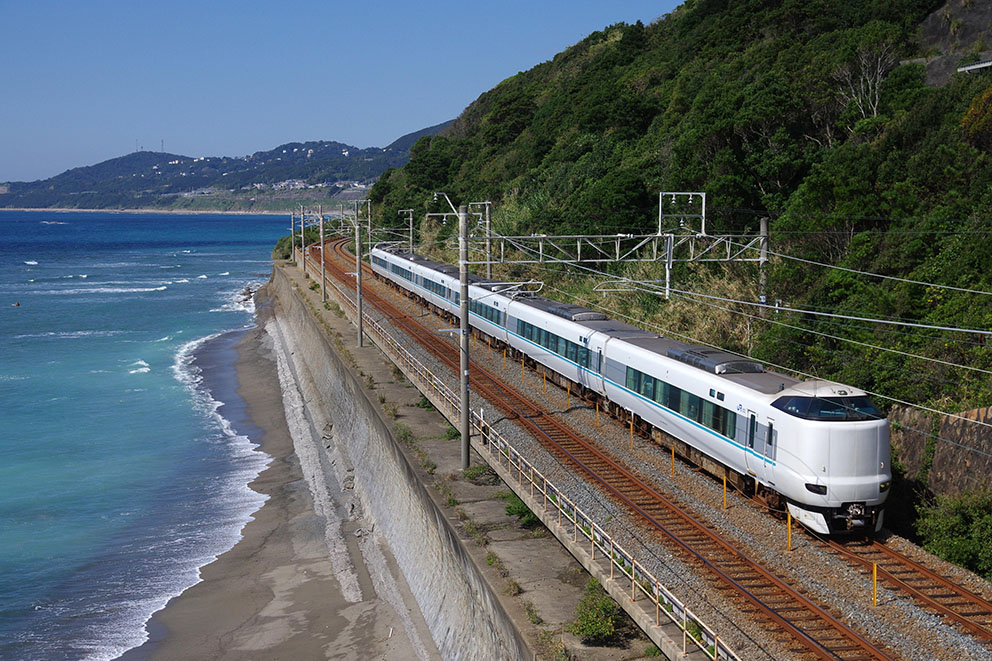
Depart: 8:58 Shin-Osaka
Depart: 9:19 TennojiArrive: 11:21 Kii-Tanabe
The JR train travels down the west coast of the Kii peninsula.
As you head south the scenery changes dramatically from the large urban centers to agricultural and natural regions, with distinctively less populated mountains.
Watch for terraced orange and ume orchards along the way.
TIP: Sit on the right hand side of the train for the best views.
-
VISIT TANABE TOURIST INFORMATION CENTER
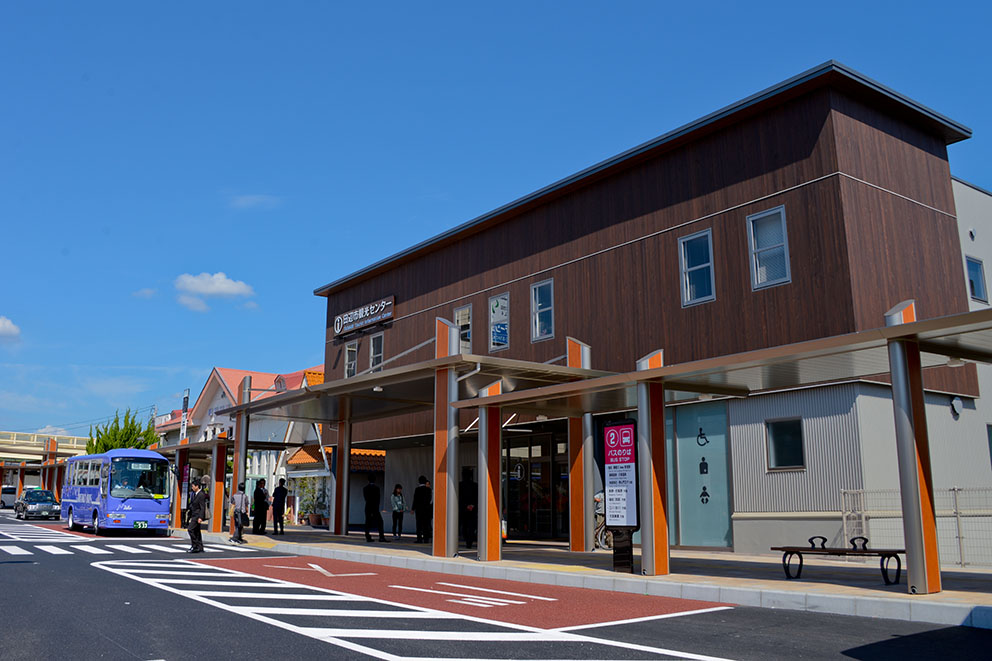
This information center is next to the Kii-Tanabe station as you exit on the left.
There are paper copies of maps and transportation timetables as well as Dual Pilgrim credential to collect stamps along the trail.
This is the best place to get the most up-to-date information before you begin your walk! -
VISIT TANABE
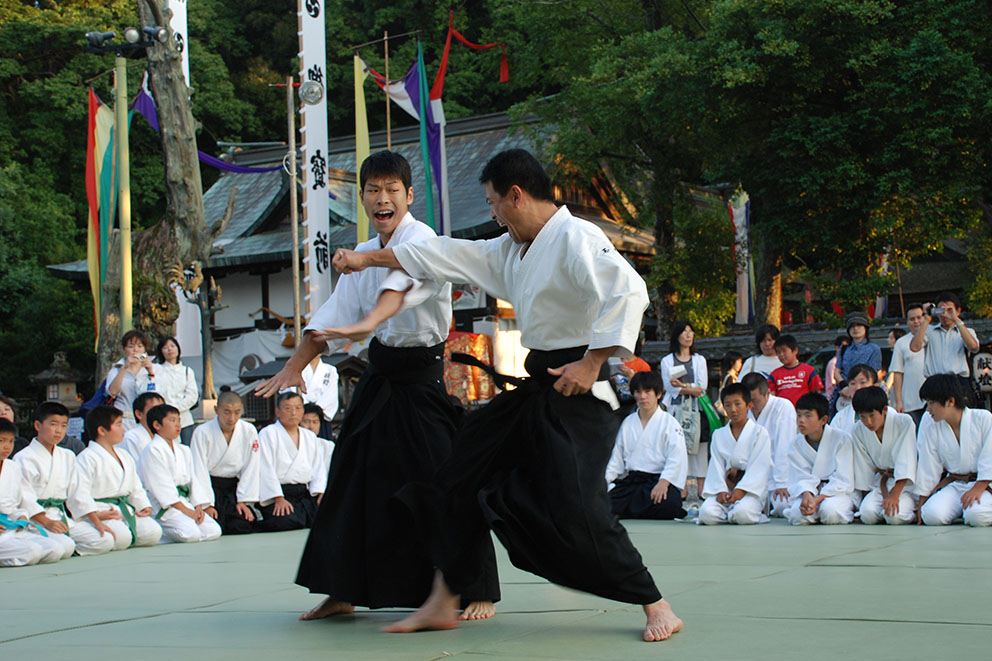 Tanabe is a small coastal city on the west side of the Kii Peninsula, well known for its agricultural products such as ume (Japanese Apricots) and oranges, as well its fresh seafood.
Tanabe is a small coastal city on the west side of the Kii Peninsula, well known for its agricultural products such as ume (Japanese Apricots) and oranges, as well its fresh seafood.
The downtown area is located southwest of the Kii-Tanabe train station, from which a ten minute walk leads to the Ogigahama beach.
Near the station is Tokei-jinja, a main shrine at the junction of the Nakahechi and Ohechi routes.
INTERESTING FACT: Ueshiba Morihei, the founder of the Aikido martial, was born in Tanabe. -
OVERNIGHT IN TANABE
There are a diversity of guesthouses and business style hotels in Tanabe.
-
SUPPER
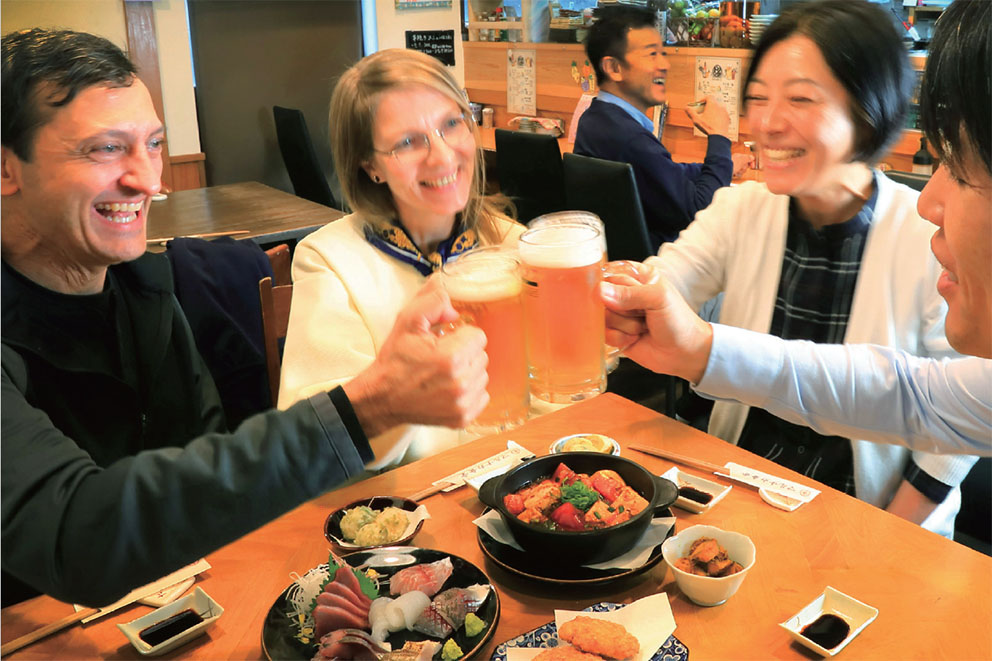 The entertainment area in front of the JR Kii-Tanabe station is called “Ajikoji” and is packed with over 200 restaurants and Japanese style pubs (Izakaya).
The entertainment area in front of the JR Kii-Tanabe station is called “Ajikoji” and is packed with over 200 restaurants and Japanese style pubs (Izakaya).
It is considered to be the most concentrated of its kind for a city of this size in the entire country of Japan. Every alley is full of quaint places to eat and drink.
Many restaurants have English menus. Ask at the information center for recommendations.
Kanpai!
DAY 2
Walk Kumano Kodo, Takijiri-oji to Chikatsuyu
Overnight: Chikatsuyu
-
DAY 2 OVERVIEW
DAY TWO is a transfer to the trailhead at Takijiri-oji and full day walk on the Kumano Kodo to Chikatsuyu village.
NOTE: The Kumano Kodo is a mountain trail, therefore walking times vary greatly depending on weather, season, personal experience, and fitness. Please plan accordingly for a safe walk, as many people underestimate the difficulty of the terrain. -
BREAKFAST
At accommodation.
-
LUGGAGE SHUTTLE
Leave luggage at accommodation.
-
BUS FROM KII-TANABE STATION TO TAKIJIRI (Meiko Bus)
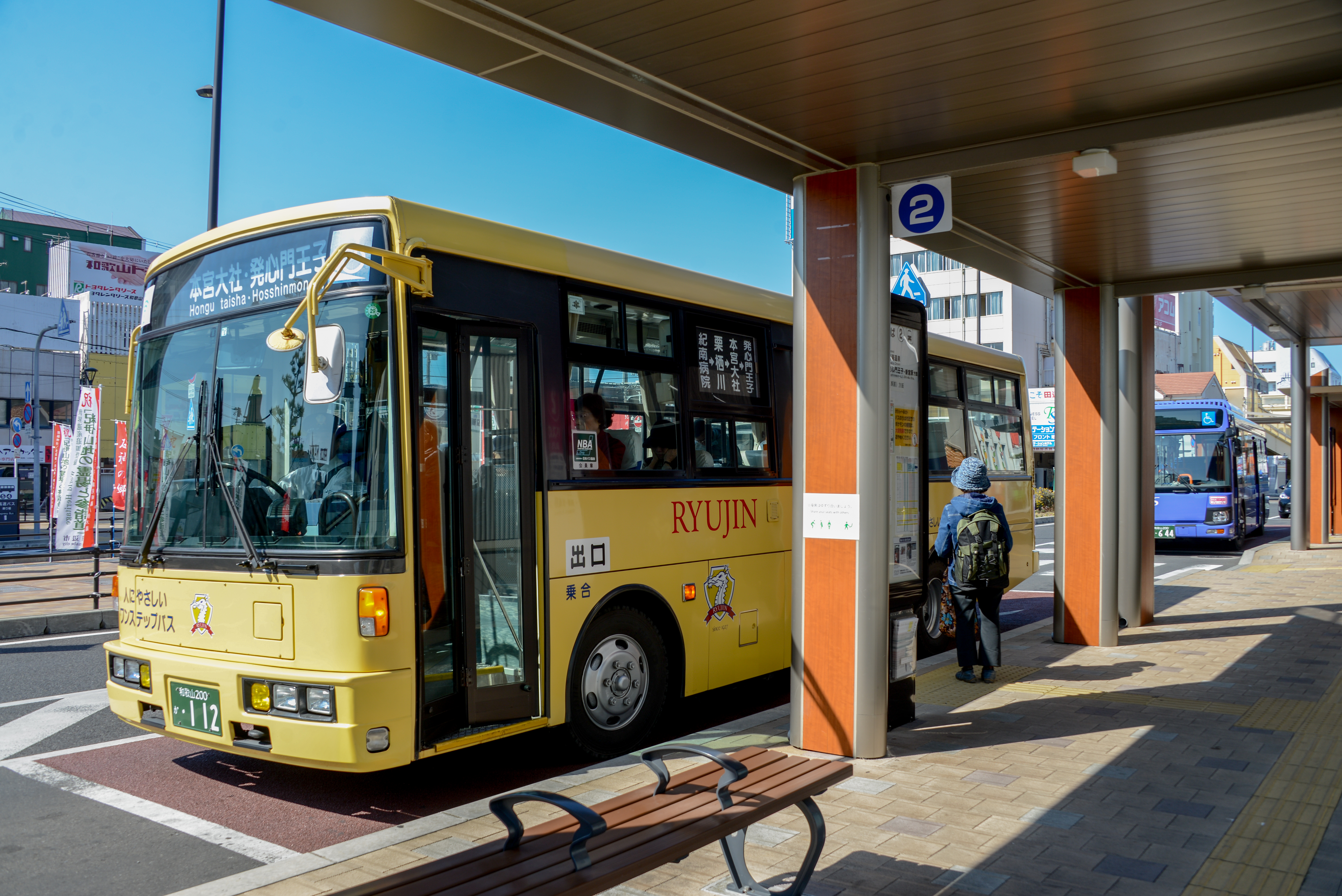
Depart: 8:32 Kii-Tanabe
Arrive: 9:10 Takijiri
Busses depart from bus stop two in front of the station.
PRICE: 970 yen
-
VISIT KUMANO KODO KAN PILGRIMAGE CENTER
The round Kumano Kodo Kan Pilgrimage Center is located across the river from Takijiri-oji.
There are introductory exhibitions in Japanese and English about the pilgrimage route.
Toilets and vending machines are available.
-
VISIT TAKIJIRI-OJI
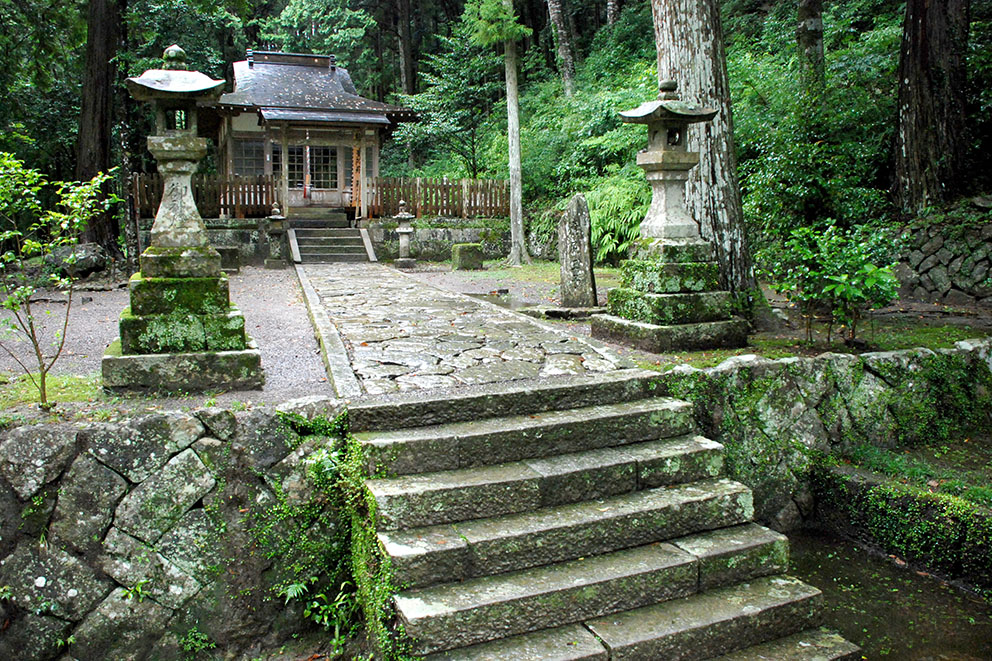 Takijiri-oji is one of the main trailheads of the Nakahechi route.
Takijiri-oji is one of the main trailheads of the Nakahechi route.
It is here that the passage into the sacred mountains begins—the entrance to the abode of the gods and Buddhist paradises of rebirth.
There were once extensive halls, a bath house, lodgings for pilgrims, and residences for priests, priestesses and monks in the area.
-
WALK KUMANO KODO - TAKIJIRI-OJI TO CHIKATSUYU
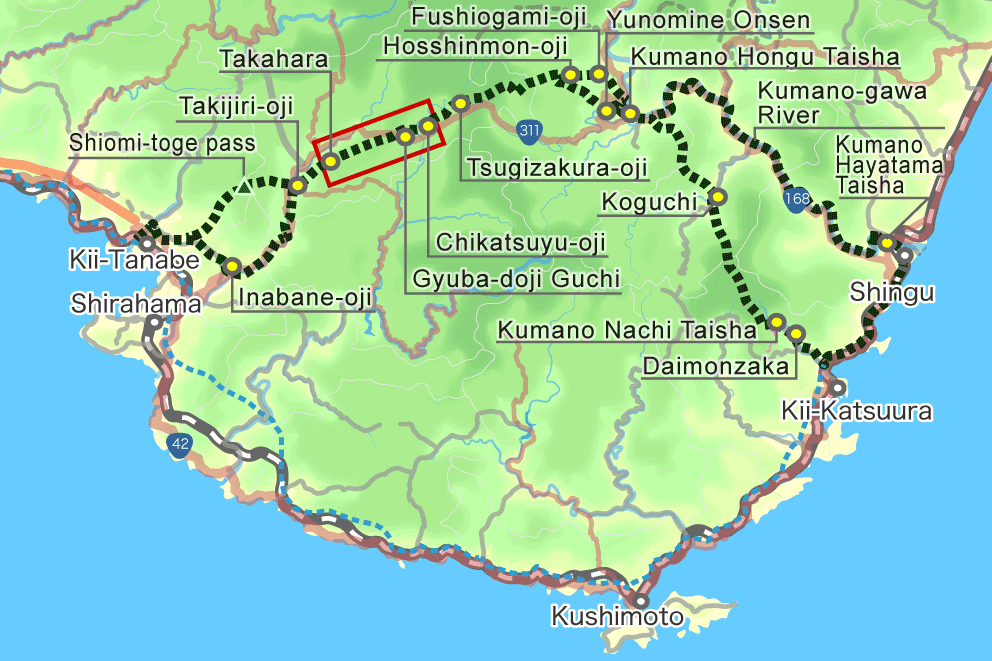
Distance: ~14 km
Time: 6~8 hr
Elevation Gain: ~1010 m
Elevation Loss: ~840 m
This is a short but steep uphill walk from Takijiri to the ridge top settlement of Takahara. From Takahara the trail continues over a pass arriving in Chikatsuyu village.
NOTE: The trail starts off with a challenging grade so set a slow, easy pace, watching your steps on the rocks and roots.Kumano Kodo Map 1
Kumano Kodo Map 2 -
VISIT TAKAHARA
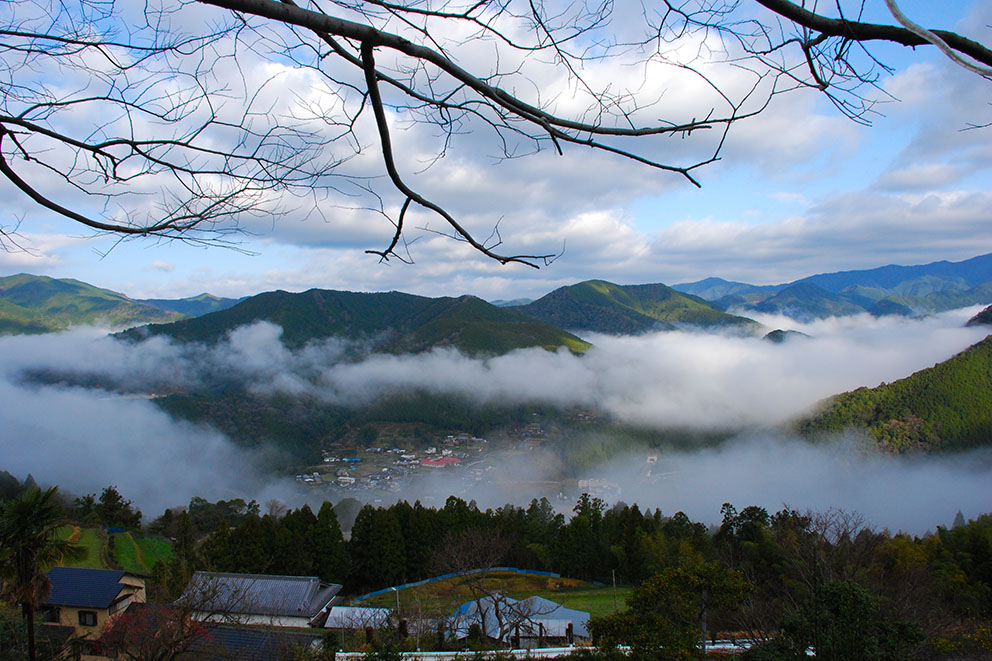 Takahara is a small settlement on a ridgeline with panoramic views of the Hatenashi mountain range.
Takahara is a small settlement on a ridgeline with panoramic views of the Hatenashi mountain range.
It is the site of the mystical Takahara Kumano-jinja shrine, one of the oldest buildings along this section of the pilgrimage route. The shrine grounds are home to giant camphor trees, over 800 years old!
Takahara is known as "Kiri-no-Sato" (Village in the Mist) because the scenic vistas are often blanketed with mist. The valley below dramatically fills with fog, creating a beautiful sea of clouds. -
LUNCH
Picnic lunch along the trail.
NOTE: Buying lunch in Tanabe before boarding the bus is often the best option. -
VISIT CHIKATSUYU
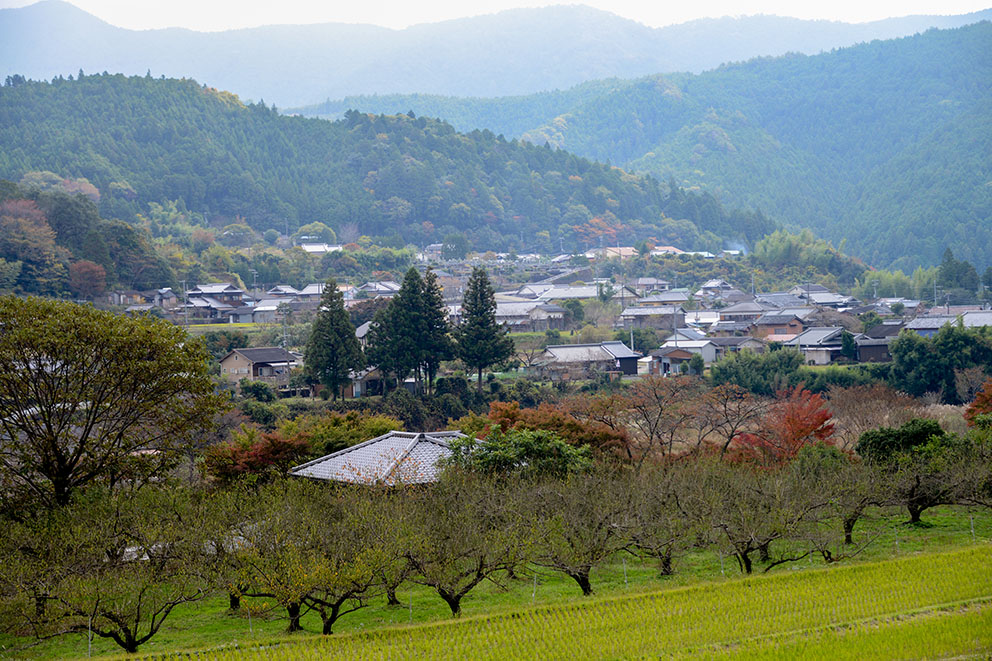 The village after Takahara is Chikatsuyu where the clear Hiki-gawa river runs through the valley.
The village after Takahara is Chikatsuyu where the clear Hiki-gawa river runs through the valley.
Pass through Chikatsuyu towards Tsugizakura-oji. -
OVERNIGHT IN CHIKATSUYU
There are some minshuku guesthouses and rental houses in Chikatsuyu.
-
SUPPER
At accommodation.
DAY 3
Walk Kumano Kodo, Chikatsuyu-oji to Kumano Hongu Taisha
Overnight: Yunomine Onsen
-
DAY 3 OVERVIEW
This is a challenging full day walk with many climbs and descents, finishing at the Kumano Hongu Taisha.
The mid-section is a permanent detour over the pass. The trail from Hosshinmon-oji to Hongu is popular with a diversity of forested trail and settlement scenery.
There are a few ways to shorten this walk, three options are outlined below. Feel free to choose which option on the day of your walk. -
BREAKFAST
At accommodation.
PICK UP LUNCH BOX
It is usually easiest to order your lunch box from the accommodation. Book a lunch box plan to take advantage of this service. -
LUGGAGE SHUTTLE
Leave luggage at accommodation.
-
Option 1 (Full Walk)
WALK KUMANO KODO - CHIKATSUYU-OJI TO KUMANO HONGU TAISHA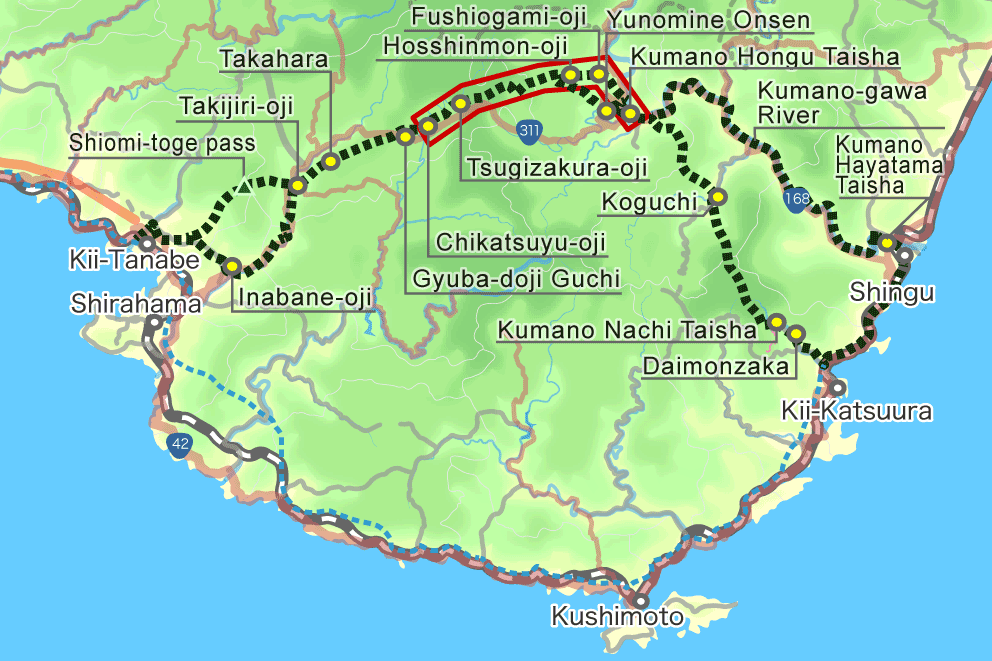
Distance: ~25 km
Time: 9~12 hr
Elevation Gain: ~1210 m
Elevation Loss: ~1470 m
This is a challenging full day walk with many climbs and descents, finishing at the Kumano Hongu Taisha.
Best to start early if attempting the full walk.Kumano Kodo Map 1
Kumano Kodo Map 2
Walk Options -
Option 2 (Intermediate Walk)
WALK KUMANO KODO - DOYUKAWA-BASHI BUS STOP TO KUMANO HONGU TAISHA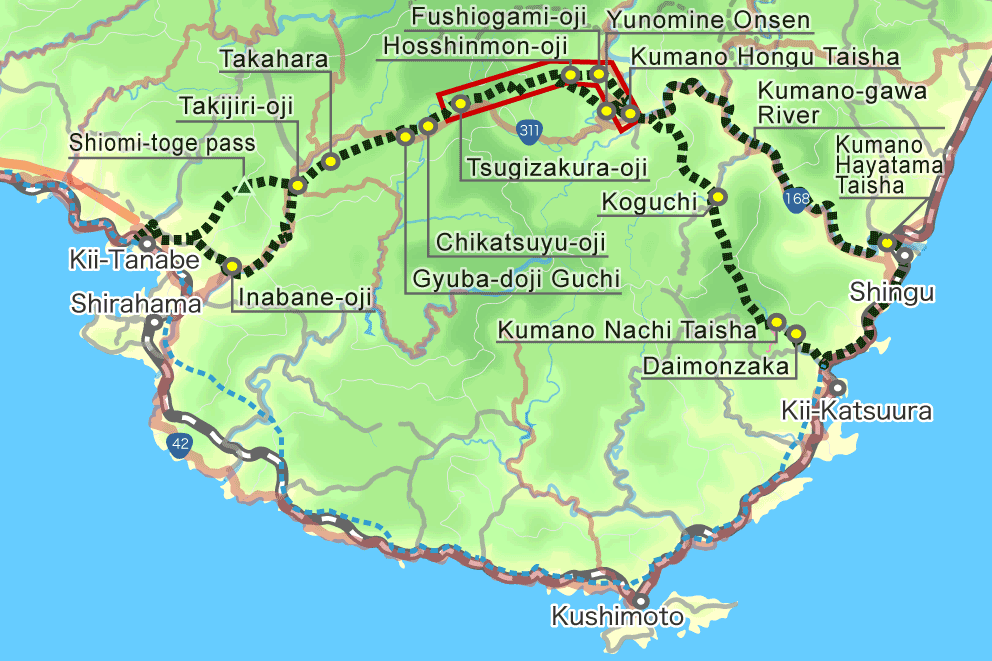
Distance: ~17 km
Time: 6~9 hr
Elevation Gain: ~770 m
Elevation Loss: ~1170 m
BUS FROM CHIKATSUYU TO DOYUKAWA-BASHI (Ryujin Bus)Depart: 7:23 Chikatsuyu-oji
Arrive: 7:33 Doyukawa-bashiPRICE: 280 yen
Kumano Kodo Map 1
Kumano Kodo Map 2
Walk Options
Bus Timetable #1 -
Option 3 (Highlight Walk)
WALK KUMANO KODO - HOSSHINMON-OJI TO KUMANO HONGU TAISHA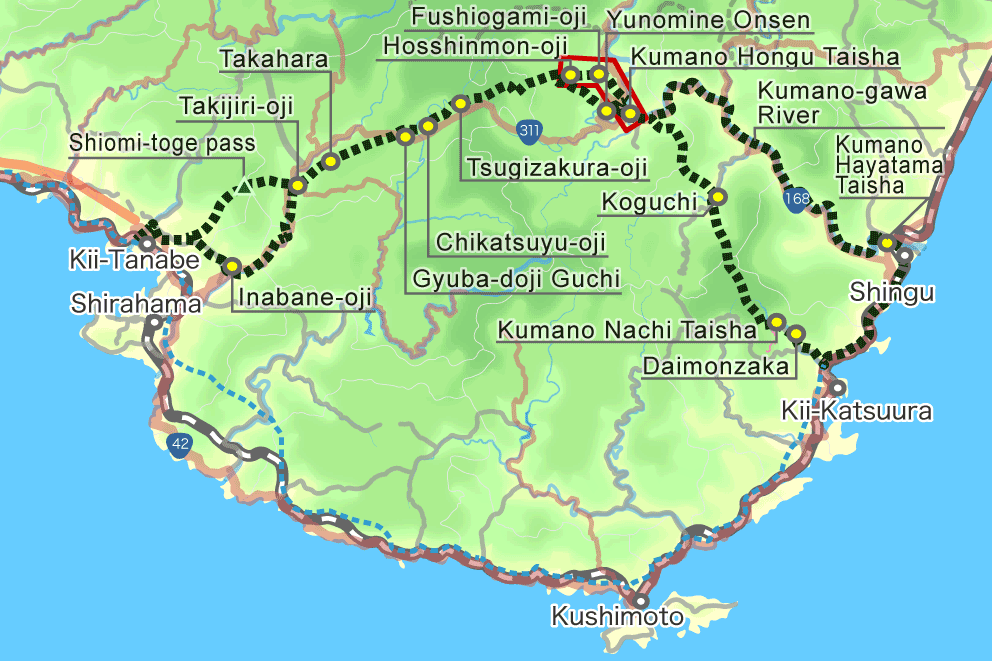
Distance: ~7.5 km
Time: 2~3 hr
Elevation Gain: ~190 m
Elevation Loss: ~460 m
The section from Hosshinmon-oji and Hongu is popular with a diversity of forested trail and settlement scenery. This a good option to give more time to experience the shrines and sites in Hongu. Take a local bus from Chikatsuyu-oji to Hosshimon-oji.
BUS FROM CHIKATSUYU TO HOSSHINMON-OJI (Ryujin Bus)Depart: 7:23 Chikatsuyu-oji
Arrive: 8:37 Hosshinmon-ojiPRICE: 970 yen
NOTE: With this shorter walk often people include the Dainichi-goe route in the afternoon (Hongu to Yunomine Onsen) (~2 km, 1~2 hr). -
LUNCH
Picnic lunch along the trail.
-
VISIT KUMANO HONGU TAISHA
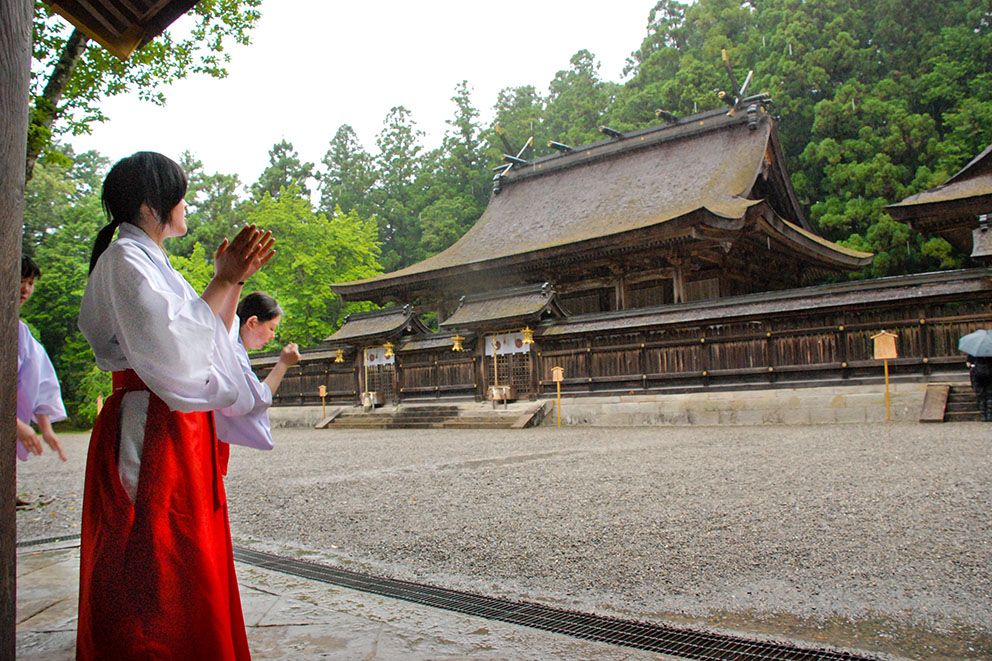
One of the three grand shrines, Kumano Hongu Taisha stands on a small ridge line in the north of the Hongu village.
The austere pavilions are made of wood with impressive cypress bark roofs; it's architecture style dating back over 800 years.
Watch for the sacred symbol of Kumano, the Yatagarasu three-legged crow.
-
VISIT KUMANO HONGU HERITAGE CENTER
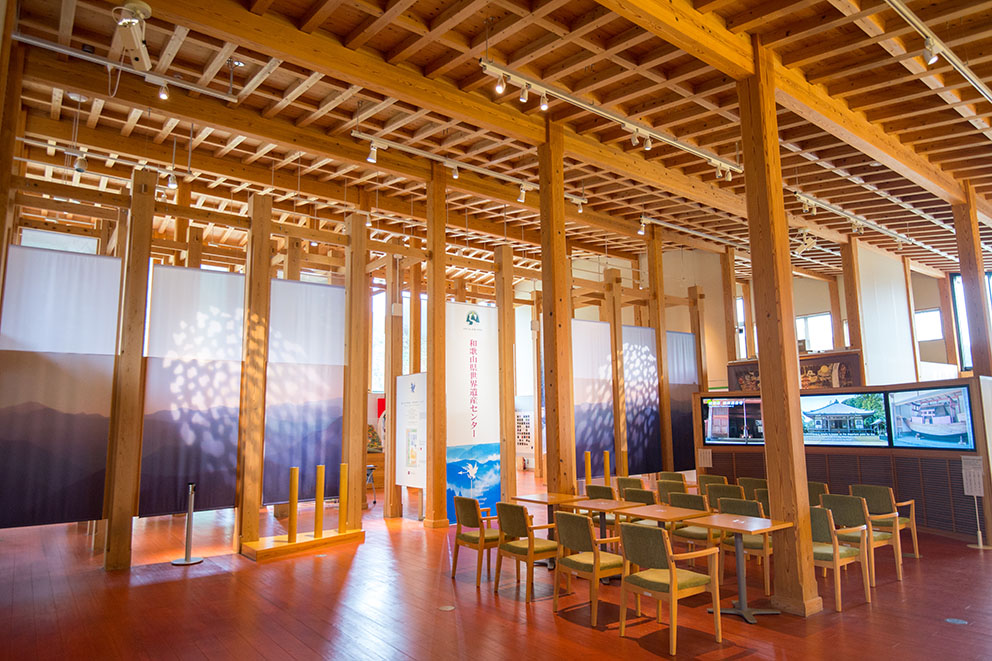
This visitor center is on the east side route 311 across from the Kumano Hongu Taisha grand shrine.
It has detailed information and exhibits about the area in English.
HOURS: 9:00~17:00 (open year-round)
NOTE: Registration as DUAL PILGRIM takes place here. It takes at least 15 minutes and cannot be mailed out.Kumano Hongu Heritage Center
Dual Pilgrim -
VISIT OYUNOHARA
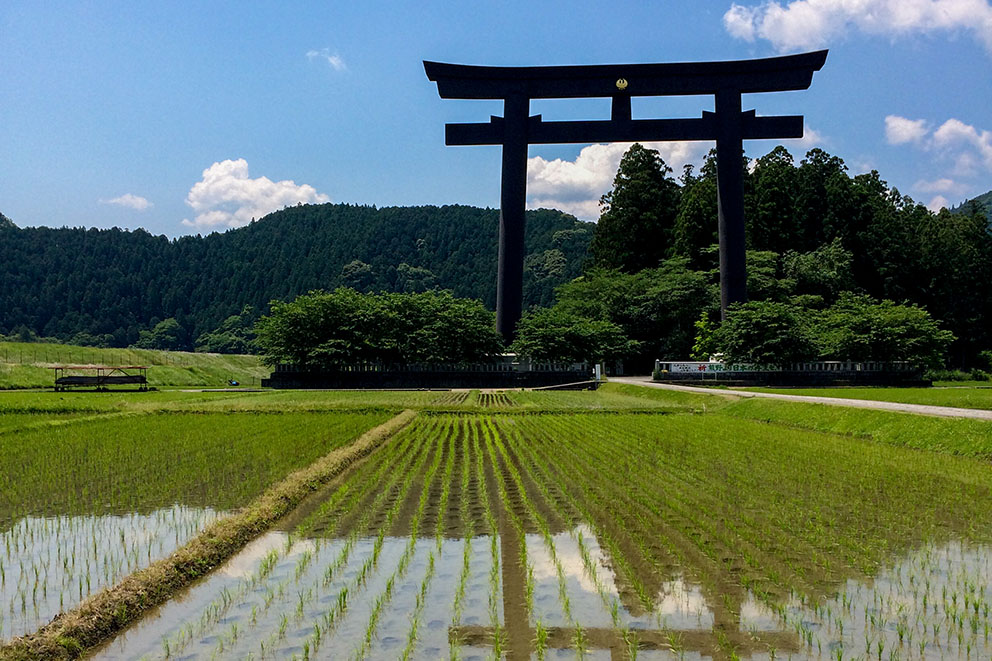
Kumano Hongu Taisha was originally located at Oyunohara, a sandbank at the confluence of the Kumano-gawa and Otonashi Rivers.
Legend has it that the Kumano deities, in the form of three moons, descended into the branches of a giant oak tree in this clearing.
All of the Kumano Kodo pilgrimage routes lead to this sacred site.
The entrance to Oyunohara is marked by the largest Torii shrine gate in the world (33.9 meters tall and 42 meters wide). It is a formalized gateway that designates the entrance to a sacred area and signifies the division of the secular and the spiritual worlds. -
BUS FROM HONGU TO YUNOMINE ONSEN (Nara Kotsu)
Depart: 16:58 Hongu Taisha-mae
Arrive: 17:09 Yunomine Onsen
Busses depart from in front of the Kumano Hongu Heritage Center.
PRICE: 310 yen
NOTE: After the 16:58 bus there is a long wait until the next one. For Saturdays, Sundays and national holidays, the 16:23 bus (not the 16:58) is the best option available.
-
VISIT YUNOMINE ONSEN
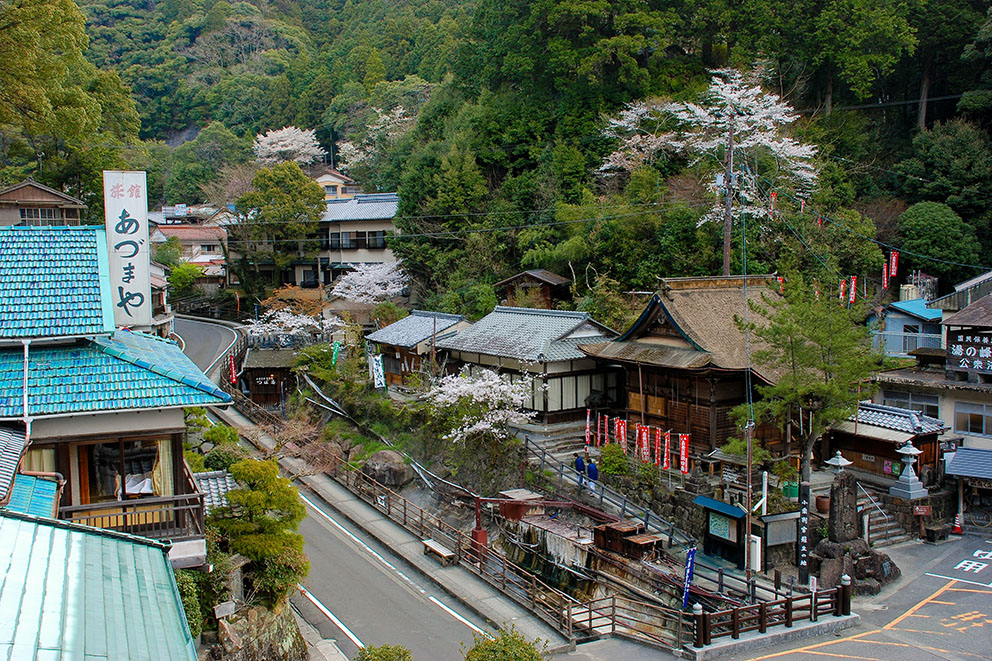
Yunomine Onsen is one of the oldest hot springs in Japan and directly connected with the Kumano Kodo. It is a quaint little collection of inns tucked into a small valley.
Tsuboyu is an historic bath which was used by pilgrims past to purify themselves with the hot water. Tickets are sold at the booth next to the temple.
-
OVERNIGHT IN YUNOMINE ONSEN
There is a diversity of accommodations in Yunomine Onsen such as Ryokan inns, Minshuku lodgings, each with their own hot spring baths.
-
SUPPER
At accommodation.
DAY 4
Bus to Tanabe, Return to Osaka/Kyoto
-
DAY 4 OVERVIEW
DAY FOUR is a transfer from Yunomine Onsen to Kii-Tanabe by local bus and then a train to next the destination. -
BREAKFAST
At accommodation.
-
BUS FROM YUNOMINE ONSEN TO KII-TANABE (Ryujin Bus)
Depart: 8:29 Yunomine Onsen
Arrive: 10:10 Kii-TanabePRICE: 1980 yen
-
TRAIN FROM KII-TANABE TO OSAKA (JR Kuroshio 18)
Depart: 11:32 Kii-Tanabe
Arrive: 13:50 Shin-Osaka
-
OTHER OPTIONS
There are a few options after the trek including the following:
1. Staying another night in the Hongu area.
2. Continue south to complete the circuit of the Kumano Sanzan Grand Shrines.
3. Heading north to Koyasan, a Buddhist monastic village.Access Koyasan
Access to Kumano Sanzan Grand Shrines
